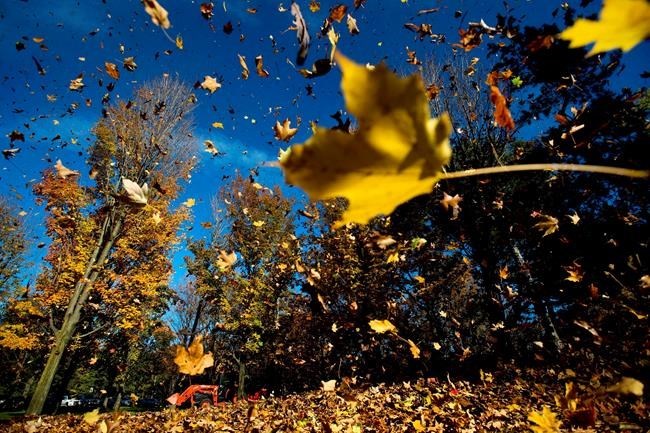
Park workers use a tractor with a industrial leaf blower to pile up fall leaves at High Park in Toronto on Monday, Oct. 28, 2013.THE CANADIAN PRESS/Nathan Denette
Republished October 31, 2018 - 10:54 AM
Original Publication Date October 31, 2018 - 10:06 AM
FREDERICTON - Good news for the lazy: Canada's leading conservation group is asking people not to rake their lawn.
"It's good news if you don't like raking the leaves because leaving them on the ground is the environmentally friendly thing to do," said Andrew Holland, a spokesman for the Nature Conservancy of Canada.
He said the leaves provide a space for many small creatures to survive the winter.
"They provide habitat for butterflies, moths and different kinds of insects that can overwinter under the leaves. It's also good for frogs and toads. The insects that overwinter provide food for birds in the spring," he said.
Dan Kraus, the NCC's senior conservation biologist, said people can also help migratory and resident birds survive winter by not clearing up their gardens.
"Fruits and seeds that remain on flowers and shrubs are a crucial food source that sustains many songbirds, such as goldfinches, jays and chickadees," said Kraus.
"Overwintering insects in our yards also provide an important food source for birds. Providing winter habitats for our native birds and insects is just as important as providing food and shelter during the spring and summer."
Holland said if you're worried about smothering the lawn or having clogged gutters, the leaves can be tucked under bushes or in other areas away from your house.
"These leaves provide good mulch for scrubs and help prevent the freeze/thaw cycle in the roots through the winter," he said.
Lawn care company, Scott's Canada, recommends using a lawn mower to mulch leaves into tiny pieces on your lawn and applying a fall fertilizer that's rich in nitrogen.
"You want to reduce your leaf clutter to dime-size pieces. You'll know you're done when about half an inch of grass can be seen through the mulched leaf layer. Once the leaf bits settle in, microbes and worms get to work recycling them," the website states.
For those who do like the look of a well-raked lawn, many cities across the country collect and compost leaves for use in gardens and flower beds.
In parts of Toronto, homeowners are even allowed to rake the leaves to the edge of the roadway on specific dates, where specialized equipment will come along and remove them.
News from © The Canadian Press, 2018